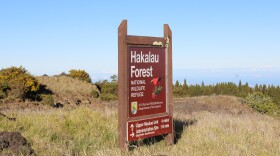-
The administration wants to expand the Waimanalo Gulch Sanitary Landfill in West Oʻahu, which is scheduled to close in 2028 — ahead of reaching capacity.
-
Hawaiʻi's waters contain more than 600 native limu species. Karla McDermid guesses she can identify 40 of them by touch alone. Marine biologist Karla McDermid has created a "Limu Ark," a living library on Hawaiʻi Island of about 70 native seaweed species.
-
Nathan Marcy of the nonprofit group Defenders of Wildlife spoke with HPR’s Maddie Bender about the state of the National Wildlife Refuge System.
-
Hawaiʻi Senate President Ron Kouchi reacts to Gov. Josh Green's State of the State address; Dean Minakami, executive director of the Hawaiʻi Housing Finance and Development Corporation, shares details on state programs to help first-time homeowners get into the housing market
-
Sara Gabrielson from the Hawaiʻi Wildfire Management Organization and Kathryn Dressendorfer from the Surfrider Foundation spoke with HPR’s Maddie Bender about a new approach to landscaping on Maui.
-
The Hawaiʻi Wildlife Fund and Pōhaku Pelemaka submitted a joint petition earlier this month asking for officials to regulate the movement of CRB host materials around the island.
-
Writer and illustrator Erzsi Kuba Palko spoke with HPR’s Lillian Tsang about her keiki book “Under the ʻŌhiʻa Tree.”
-
ACLU President Deborah Archer discusses how the work of the organization has changed under the second Trump administration; Chef Jason Peel discusses his decision to close Nami Kaze at Pier 38 and his next culinary venture
-
On today's program, we're revisiting stories about Kahoʻolawe.
-
The military has released a factbook detailing its importance and contributions to Hawaiʻi, but continues to wrestle with its shortcomings, especially when it comes to environmental stewardship.
Play Live Radio
Next Up:
0:00
0:00
Available On Air Stations










